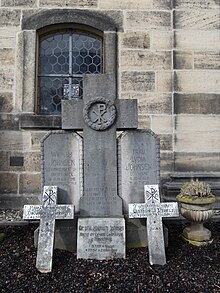Helmuth Johnsen
Helmuth Johnsen (born November 29, 1891 in Neustadt near Coburg ; † September 2, 1947 in the Zrenjanin / Yugoslavia camp ) was a Protestant bishop, national activist, member of the NSDAP and the German Christians .
Life
Johnsen grew up as the son of the pastor in Neustadt near Coburg and attended the Casimirianum high school in Coburg . Initially he studied in Kiel jurisprudence . On the occasion of the dispute over the Cologne pastor Carl Jatho , he began studying Protestant theology , among others in Leipzig , Erlangen and Halle (Saale) . During his studies he became a member of the Association of German Students Erlangen . During the First World War , he interrupted this, volunteered as a war volunteer and was appointed as a reserve officer. In April 1919 Johnsen passed the theological exam and became vicar and pastor in Gauerstadt until 1929 . There he married Alice Hansen, a sister of Georg Alexander Hansen .
Johnsen supported the Ehrhardt Brigade fighting against the Weimar Republic and became active in the nationalist movement . Johnsen established the Young German Order in Franconia , which published the Coburger Warte newspaper from April 1923 . Johnsen, a radical anti-Semite , was responsible for the content and the political part of the newspaper, which among other things also published inflammatory articles against Jews. During the Hitler-Ludendorff putsch , as leader of the Völkisch in the Franconian-Thuringian region, he waited for the order to march on Berlin . After the coup failed, he fought the Weimar Republic from 1924 to 1928 as a member of the Völkisch Block in the Bavarian state parliament .
In 1928, Johnson earned his doctorate at the University of Erlangen with the theme The State image JG Fichte . From 1929 to 1934 he was the main pastor at Lübeck Cathedral . On October 17, 1930, the son Hartmut, from 1991 Consistorial President of the Church Province of Saxony , was born. In June 1934 Johnsen was commissioned to head the Evangelical Lutheran Regional Church in Braunschweig . On November 15, 1934 he was elected regional bishop by the regional church assembly. Then he declared: "Everyone in the country should know that I am a National Socialist". One of his declared goals as a church leader was "the recognition of National Socialism as a space in which the church proclamation should take place and take effect". The family moved to Wolfenbüttel. In 1936 he became Reichsobmann of the German Evangelical Men's Work. In 1937 he was one of those who signed the declaration of the 96 Protestant church leaders against Alfred Rosenberg because of his writing Protestant Rome Pilgrims .
After the attack on Poland and the outbreak of World War II , he wrote in the Official Gazette on September 4, 1939: “The decision has been made. The enemy wants war. ”From 1940 he took part in the Second World War as a reserve officer . In spring 1945 he was taken prisoner by Yugoslavia and shot there in 1947. The camp commandant announced that this happened on the run, while fellow prisoners suspected murder because Johnsen had never expressed thoughts of escape and there were no signs of it.
literature
- Dietrich Kuessner : Regional Bishop Dr. Helmuth Johnsen ; Büddenstedt: Evangelical Parish Office Offleben, 1982; ISBN 3-922571-06-9 .
- Marc Zirlewagen: Helmuth Johnsen. In: Biographisch-Bibliographisches Kirchenlexikon (BBKL). Volume 24, Bautz, Nordhausen 2005, ISBN 3-88309-247-9 , Sp. 913-917.
- Karl Friedrich Reimers: Lübeck in the church struggle of the Third Reich: National Socialist leader principle and Evangelical Lutheran regional church from 1933 to 1945. Göttingen: Vandenhoeck & Ruprecht 1964
- Jörg Fligge : Lübeck schools in the "Third Reich": a study on education in the Nazi era in the context of developments in the Reich , Schmidt-Römhild, Lübeck 2014, ISBN 978-3-7950-5214-0 , p. 979 ( Biographische Notes )
Web links
- Literature by and about Helmuth Johnsen in the catalog of the German National Library
- Helmuth Johnsen in the parliamentary database at the House of Bavarian History
- Gabi Bertram: Helmuth Johnson - Nice pastor with a deep brown vest . www.np-coburg.de, May 30, 2009
Individual evidence
- ↑ Louis Lange (Ed.): Kyffhäuser Association of German Student Associations. Address book 1931. Berlin 1931, p. 103.
- ↑ Karsten Hansen: Resistance and Defense. From the life of Colonel i. G. Georg Alexander Hansen . Rangsdorf 2014, p. 10.
- ↑ a b c Quote from Ernst Klee : The dictionary of persons on the Third Reich. Who was what before and after 1945 . Frankfurt am Main: Fischer, 2005 2 ; P. 289.
- ↑ Friedrich Siegmund-Schultze (Ed.): Ecumenical Yearbook 1936–1937 . Max Niehans, Zurich 1939, pp. 240–247.
- ^ Dietrich Kuessner: Regional Bishop Dr. Helmuth Johnsen ; P. 78.
| predecessor | Office | successor |
|---|---|---|
| Oskar Evers | Regional bishop of the Evangelical Lutheran Church in Braunschweig 1934–1947 |
Martin Erdmann |
| personal data | |
|---|---|
| SURNAME | Johnsen, Helmuth |
| BRIEF DESCRIPTION | German Protestant bishop |
| DATE OF BIRTH | November 29, 1891 |
| PLACE OF BIRTH | Neustadt near Coburg |
| DATE OF DEATH | September 2, 1947 |
| Place of death | Zrenjanin camp , Yugoslavia |
